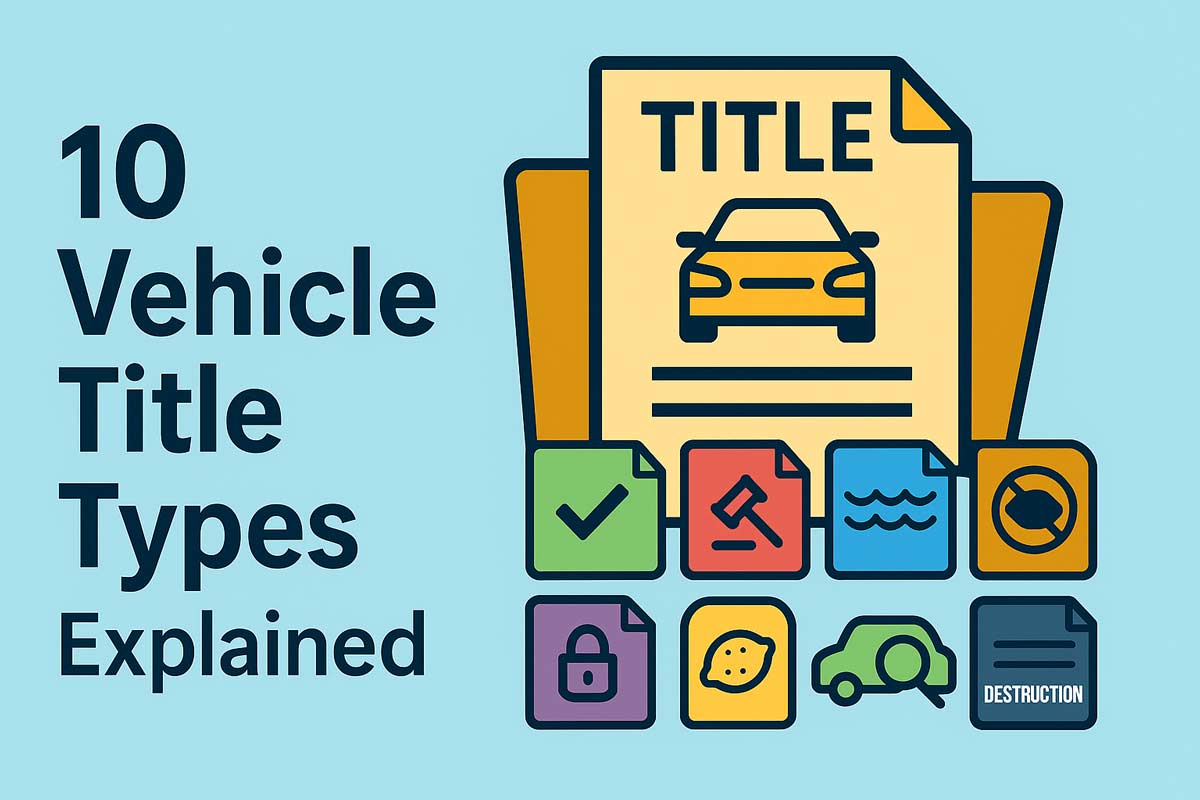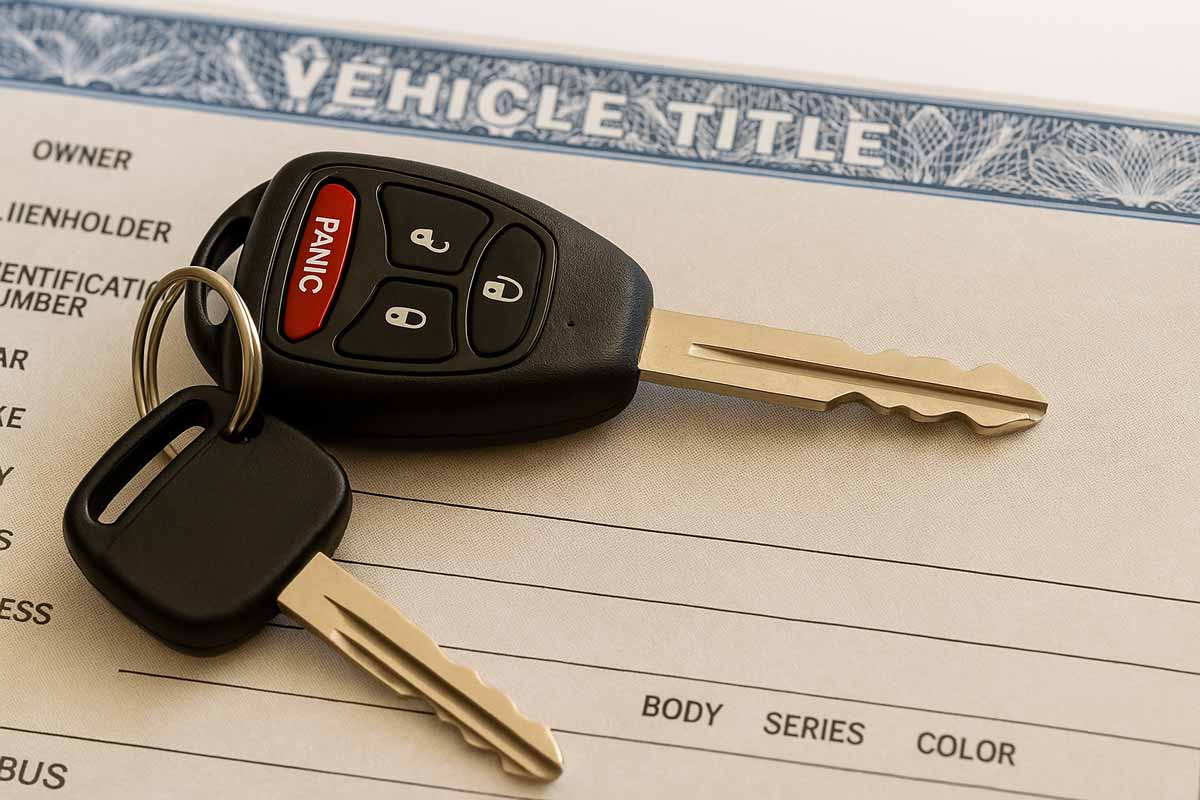 https://auction.ridesafely.com/images/2025/10/own-supercar-for-less-banner.jpg
865
1440
RideSafely
/images/2025/01/ridesafely-logo.svg
RideSafely2025-10-10 13:42:502025-10-13 12:18:37How to Own a Supercar for Less: Wrecked Exotics for Sale
https://auction.ridesafely.com/images/2025/10/own-supercar-for-less-banner.jpg
865
1440
RideSafely
/images/2025/01/ridesafely-logo.svg
RideSafely2025-10-10 13:42:502025-10-13 12:18:37How to Own a Supercar for Less: Wrecked Exotics for SaleLet’s face it—buying a car isn’t just about the shiny rims, horsepower, or how good you look behind the wheel. If you’re not paying close attention to that unassuming little piece of paper called the vehicle title, you could end up with more problems than perks.
That title? It’s the car’s legal birth certificate. It tells you where it came from, who owns it, how clean its past is—and whether you should run the other way.
So, whether you’re a seasoned weekend auction buyer, a car flipper, a first-time buyer, or just someone trying to avoid a lemon, here’s a no-nonsense breakdown of the 10 vehicle title types you need to know before making a deal.
1. Clear Title (Clean Title)
A Clear Title, also known as a Clean Title, indicates that the vehicle has no significant issues or recorded damage. Vehicles with clean titles have not been involved in major accidents or subjected to flood, fire, or theft damages. These cars typically maintain a higher resale value and are easily insurable and financeable. Most buyers and dealerships prefer clean-titled vehicles because they offer reliability and straightforward ownership.
Features of a Clear Title:
- No salvage records
- No liens or outstanding loans
- Vehicle has not been declared a total loss
- Easy financing and insurance options
- Highest market resale value
- Indicates full ownership and legal roadworthiness
Ideal for: Resale, financing, insuring, and full registration in all 50 states.
Warning: A clean title doesn’t mean the car is perfect. Always check the vehicle history report before you buy.
2. Salvage Title
A Salvage Title is assigned to vehicles that have been severely damaged in accidents, floods, fires, or other catastrophic events, typically when the repair costs exceed 75% of the vehicle’s value. Insurance companies classify such vehicles as “total losses.” Salvage-titled vehicles cannot legally operate on public roads unless repaired, inspected, and rebranded with a rebuilt title.
For a complete breakdown of how this process works, explore our guide on how to remove a salvage title.
Key points for Salvage Title:
- Significant damage exceeding economic repair
- Lower market value, limited financing options
- Requires state-authorized inspection for road legality
Ideal for: Individuals who plan to use the car for parts, export, or enjoy the challenge of restoring and rebuilding. It’s also great for those flipping and reselling vehicles, or buyers looking for a budget-friendly project car.
3. Rebuilt Title (Reconstructed Title)
A Rebuilt Title is issued to vehicles that were previously classified as salvage but have been restored to a roadworthy condition. To obtain a rebuilt title, the vehicle must go through a reconstruction process and pass state-mandated inspections to verify that it has been properly repaired. While rebuilt vehicles are typically insurable and legal to drive, their market value is usually lower than similar vehicles with a clean title.
Highlights of Rebuilt Title:
- Salvage vehicles restored to safe conditions
- Legal for road use after inspection
- Lower resale value compared to clear-titled vehicles
4. Junk Title (Non-repairable Title)
A Junk Title or Non-repairable Title indicates a vehicle that can never be legally repaired or driven again. These vehicles are destined solely for dismantling and selling as parts. A junk title prevents a vehicle from being returned to road use, emphasizing the severity of the damage and the associated risk.
Characteristics of a Junk Title:
- Permanently restricted from road use
- Parts-only vehicle
- Usually sold at scrap value
Vehicles with junk titles are often dismantled for scrap or resold for parts. Learn which components retain value by checking out our list of valuable parts you can salvage from a totaled car.
5. Bonded Title
A Bonded Title is issued when a vehicle lacks sufficient ownership documentation, typically due to missing or lost paperwork. Obtaining a bonded title requires purchasing a surety bond from an insurance company, protecting previous or future legitimate owners against potential claims. After a specified period (typically 3 years), bonded titles are converted to standard clear titles if no ownership claims are made.
Bonded Title Essentials:
- Resolves title ownership disputes or missing documentation
- Requires a surety bond as protection (usually processed through an insurance auction)
- Eventually, it converts to a clear title
6. Flood Title
A Flood Title is assigned explicitly to vehicles damaged by water from floods or hurricanes. Flood damage significantly impacts mechanical, electrical, and safety systems, making these vehicles risky investments. Even after repairs, flood-damaged vehicles can still experience ongoing corrosion and mold issues, substantially decreasing their resale value.
Flood Title Insights:
- Extensive water damage history
- Lower resale value and limited insurance coverage
- Long-term reliability concerns due to hidden damage
7. Lemon Title
A Lemon Title indicates that the vehicle has persistent, unresolved defects despite repeated manufacturer-authorized repair attempts. Lemon laws protect consumers from defective new vehicles by requiring manufacturers to repurchase or replace vehicles that are found to be problematic. Vehicles branded with lemon titles retain significantly lower market value and limited resale potential.
Lemon Title Considerations:
- Persistent, unresolved defects
- Manufacturer buyback due to Lemon law regulations
- Considerably lower market value
8. Odometer Rollback Title
An Odometer Rollback Title is issued when odometer fraud is detected, indicating that the vehicle’s mileage has been illegally altered. Such vehicles carry significant legal and ethical implications. Odometer rollback drastically reduces a vehicle’s marketability and significantly impacts its resale value.
Implications of Odometer Rollback Title:
- Illegal odometer tampering history
- Drastically reduced market value
- Legal and ethical purchase risks
9. Theft Recovery Title
A Theft Recovery Title applies to vehicles that were stolen and subsequently recovered by law enforcement. These vehicles are typically sold through insurance auctions after being assessed for damage. The extent of damage sustained during the theft plays a crucial role in determining the vehicle’s new title classification. Whether it remains a clean title, is issued a salvage title, or receives a rebuilt title after repairs.
Vehicles with theft recovery titles can be a wise choice for buyers looking for discounted prices on otherwise functional vehicles. However, it’s essential to carefully review the vehicle’s condition and history before purchasing.
You can browse a wide selection of Theft recovery vehicles available at RideSafely, including salvage, used, and rebuilt cars listed for sale and auction. These listings provide detailed information and photos to help you make a smart buying decision.
Theft Recovery Title Overview:
- Vehicle was previously stolen and later recovered
- May have hidden damage resulting from the theft incident
- If titled as salvage or rebuilt, resale value and marketability may be reduced
Before purchasing a recovered stolen vehicle, consider the risks. Some of these may appear in rankings of the most commonly stolen cars in the U.S., impacting both resale value and insurance costs.
10. Certificate of Destruction
A Certificate of Destruction (CoD) permanently designates a vehicle as non-repairable and unsuitable for road use, salvage, or reconstruction. Vehicles issued a CoD are typically those that have sustained severe damage, making repairs economically unfeasible.
These vehicles are completely removed from the automotive market and are either:
- Dismantled for parts within the United States, or
- Exported for use in other countries (subject to local regulations).
Key Aspects of a Certificate of Destruction:
- Permanent Non-Repairable Status – The vehicle can never be legally rebuilt or driven on public roads.
- Restricted from Reconstruction – It is prohibited to attempt restoration or registration for road use.
- Intended for Dismantling or Export – These are the only permitted outcomes for vehicles with a CoD.
11. Export Only Title
An export-only title restricts vehicle use exclusively for export purposes. These vehicles cannot be legally registered, insured, or driven on U.S. roads again. Vehicles issued an export-only title commonly originate from insurance auctions and are typically sold to international buyers who plan to ship them abroad.
How to Verify a Vehicle’s Title Type
Before purchasing a vehicle, primarily through auctions or private sellers, verifying the title type and status is critical:
- VIN Check: Conduct a comprehensive vehicle history check via reputable sources, such as Carfax, AutoCheck, or the National Motor Vehicle Title Information System (NMVTIS).
- Physical Inspection: Always inspect the vehicle in person or via a trusted professional, particularly if it carries a salvage, flood, or rebuilt designation.
- Documentation Review: Confirm accuracy and consistency of all provided paperwork, ensuring the title matches the physical vehicle characteristics and disclosed conditions.
Vehicle Title Types
| Primary Vehicle Title Types | Description |
|---|---|
| Clear Title | No damage history; highest resale value; easily insurable and financeable. |
| Salvage Title | Severe damage; repair costs exceed value; not road legal until rebuilt. |
| Junk Title | Not repairable; parts-only or scrap; permanently banned from road use. |
| Bonded Title | Issued with a surety bond due to missing or insufficient ownership documents. |
| Flood Title | Water damage from flooding; may affect mechanical and electrical systems. |
| Lemon Title | Chronic defects unresolved after multiple repairs; returned under lemon law. |
| Odometer Rollback Title | Mileage tampered or rolled back; often associated with fraud. |
| Secondary Vehicle Title Types | Description |
| Rebuilt Title | Restored salvage vehicle that passed inspection and is roadworthy. |
| Theft Recovery Title | Previously stolen and recovered; may have damage or carry a market stigma. |
| Certificate of Destruction | Vehicle must be dismantled for parts only or exported; it cannot be titled, registered, or repaired. |
Notes:
- Primary Titles: Original classifications based on condition, legal status, or documentation.
- Secondary / Derived Titles: Issued based on a prior title’s condition (e.g., Rebuilt from Salvage).
Why Knowing Vehicle Title Types Can Save You Headaches
Knowing the different types of vehicle titles helps buyers, sellers, and industry pros make smarter choices. Each title comes with its own set of rules about safety, value, and legality. Doing your homework—like checking the vehicle’s history and getting a professional inspection—can make all the difference in avoiding headaches and getting the best deal.
If you’re new to the world of damaged vehicles, our beginner-friendly guide on salvage car auctions can help you turn learning opportunities into real profits.
Vehicle Title FAQs
What is the difference between a salvage title and a rebuilt title?
A salvage title is issued to a vehicle deemed a total loss by an insurance company due to severe damage. A rebuilt title is granted after that same vehicle has been repaired and passed state inspection, making it legal to drive again.
Can you insure a car with a salvage or rebuilt title?
Salvage-titled vehicles typically can’t be insured for road use. However, rebuilt vehicles may qualify for limited coverage, depending on the insurer, although premiums may not be significantly higher.
Is it safe to buy a car with a rebuilt title?
Yes, but only if the vehicle has passed a certified inspection. It’s important to review the repair history and have a trusted mechanic perform a pre-purchase inspection.
What does a flood title mean?
A flood title indicates the vehicle suffered significant water damage, often from natural disasters. These cars may have hidden issues such as corrosion or electrical failure.
Can a junk title vehicle ever be driven again?
No. Vehicles with a junk title are deemed non-repairable and can only be sold for parts or scrap. They cannot be legally registered or driven on public roads.
What is a bonded title and how does it work?
A bonded title is issued when there are significant discrepancies in a vehicle’s documentation, such as missing ownership papers or unresolved liens. These vehicles are often sold through insurance auctions, where the auction company handles the bonded title process on behalf of the buyer. To complete the process, a surety bond equal to the vehicle’s value must be purchased, which protects against any future ownership claims. The resulting title is marked “Bonded” and remains so for three to five years, during which time valid claims may be filed. After that period, some states may allow conversion to a regular title if no disputes arise.







Leave a Reply
Want to join the discussion?Feel free to contribute!